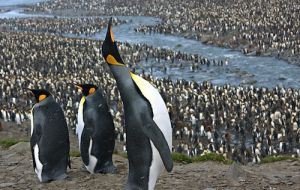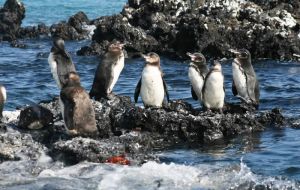MercoPress. South Atlantic News Agency
On World Penguin Day scientists call for more protection of Antarctic wildlife
 “Penguins are great ambassadors for understanding the need to conserve Southern Ocean resources,” said Christian Reiss, an Antarctic fisheries biologist at NOAA
“Penguins are great ambassadors for understanding the need to conserve Southern Ocean resources,” said Christian Reiss, an Antarctic fisheries biologist at NOAA  A Pew study in 2015 showed two thirds of the world's 18 penguin species, which range from the volcanic Galapagos Islands to the sea of Antarctica, were in decline.
A Pew study in 2015 showed two thirds of the world's 18 penguin species, which range from the volcanic Galapagos Islands to the sea of Antarctica, were in decline. The world needs to do more to protect the Antarctic wilderness and its wildlife, scientists warned Tuesday, as they marked World Penguin Day. The flightless seabirds—a favorite with children for their clumsy, waddling gait—offer a useful yardstick for researchers to judge the health of their habitat
“Penguins are great ambassadors for understanding the need to conserve Southern Ocean resources,” said Christian Reiss, an Antarctic fisheries biologist at the US-based National Oceanic and Atmospheric Administration.
“They are the iconic species of this ecosystem and the fate of their populations will depend on effective ecosystem-based management, including understanding the role of climate change and human impacts.”
A Pew study in 2015 showed two thirds of the world's 18 penguin species, which range from the volcanic Galapagos Islands on the equator to the frozen sea ice of Antarctica, were in decline.
Antarctic penguins in particular are vulnerable to climate change, with shifting ice reducing habitat while warming seas affect their prey. Scientists blame intense fishing pressure on forage species such as krill, as well as pollution, degradation of breeding grounds, and climate change.
According to the International Union for Conservation of Nature Red List of Threatened Species, only two types of penguin—Adelie and King—are increasing in numbers.
Penguins live most of their lives at sea but return to land to breed and molt, making them important gauges of marine health that are easily accessible to researchers, who can then develop realistic and effective conservation ocean strategies.
Stanford University marine scientist Cassandra Brooks, who specializes in the Antarctic, said penguin populations on the frozen continent were both increasing (Adelies in the Ross Sea) and decreasing (Chinstraps in the Antarctic Peninsula area).
“In short, we know climate change is dramatically changing the Antarctic environment and that the animals that comprise the Southern Ocean ecosystem are struggling to adapt”.
“Scientists need to continue working to untangle the complex interactions between climate change and penguin populations.”
A deal sealed last year by the Conservation of Antarctic Marine Living Resources (CCAMLR), will see a massive US and New Zealand-backed marine protected area established in the Ross Sea.
The Ross Sea is one of the last intact marine ecosystems in the world, home to penguins, seals, Antarctic toothfish, whales and huge numbers of krill, a staple food for many species. It is considered critical for scientists to study how such ecosystems function and to understand the impact of climate change on the ocean.
But two other proposals—the Australia and France-led East Antarctica sanctuary and a German plan to protect huge tracts of the Weddell Sea—are still under negotiation.
The East Antarctica sanctuary proposal spans one million square kilometers while the Weddell Sea plan would extend from the southeast of South America over an area of some 2.8 million square kilometers.
”A network of Southern Ocean MPAs (marine protected areas), which include no-take zones in areas important to penguin life history, may help ensure their survival in an uncertain future,” said Brooks.




Top Comments
Disclaimer & comment rulesCommenting for this story is now closed.
If you have a Facebook account, become a fan and comment on our Facebook Page!